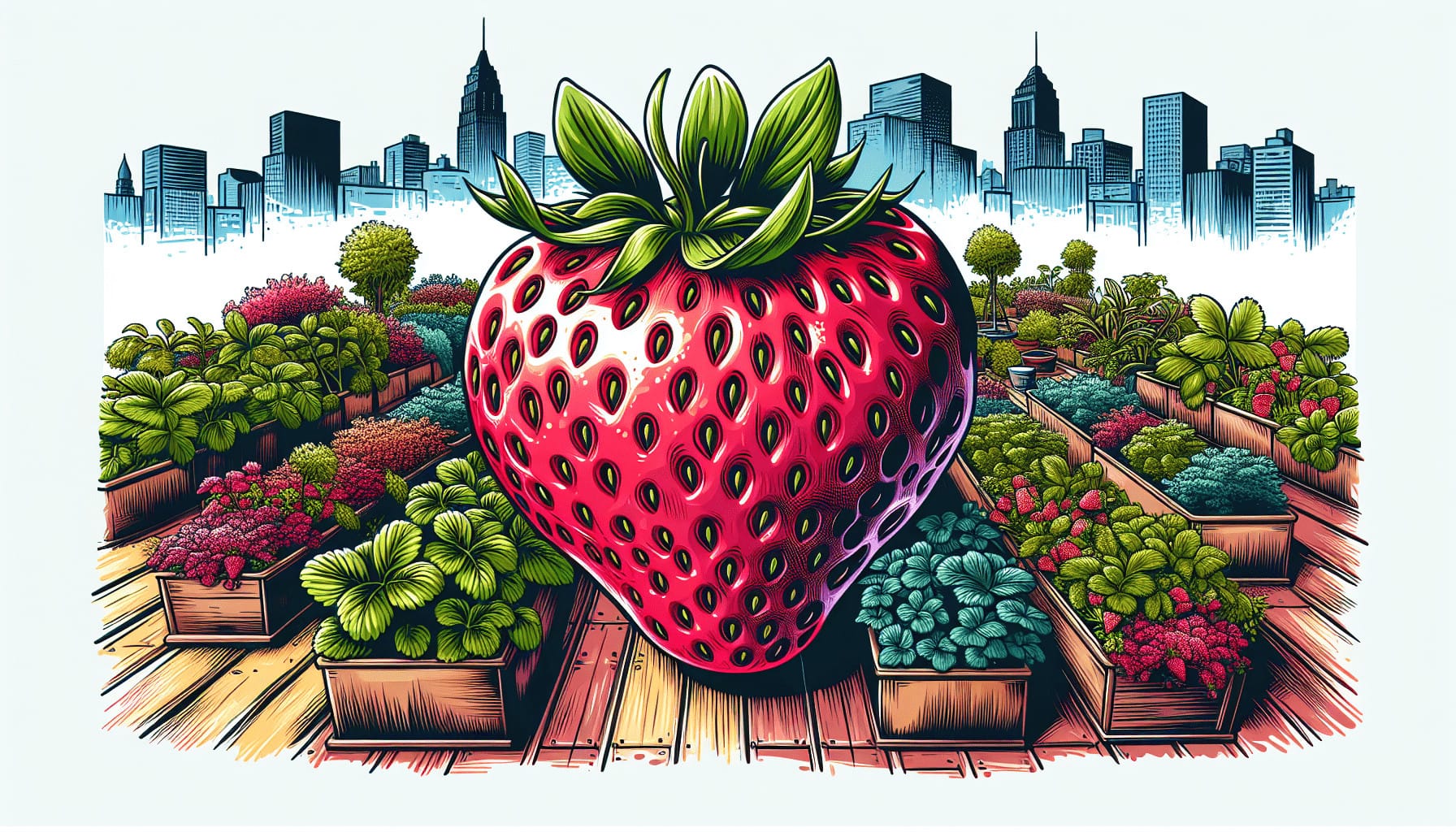Have you ever considered growing your own fruits on a rooftop garden but not sure which ones are best suited for this unique environment? You’re in luck because this comprehensive guide will provide you with all the necessary information you need to get started on your rooftop fruit garden journey. Let’s explore the best fruits that thrive on rooftop gardens and how you can maximize your harvest.
Benefits of Growing Fruits in Rooftop Gardens
Growing fruits in rooftop gardens offer a wide range of benefits. Not only does it provide a fresh and convenient source of fruits right at your doorstep, but it also contributes to a healthier and more sustainable lifestyle. Rooftop gardens help reduce heat in urban areas, improve air quality, and promote biodiversity. Additionally, tending to a rooftop fruit garden can be a therapeutic and rewarding experience, especially when you get to enjoy the fruits of your labor.
Why Choose Fruits for Your Rooftop Garden?
Fruits are not only delicious and nutritious but also add aesthetic appeal to your rooftop garden. From vibrant colors to enticing aromas, fruits can transform your rooftop space into a lush and inviting oasis. Furthermore, growing fruits allows you to connect with nature and experience the joy of harvesting and enjoying fresh produce right from your rooftop.

Factors to Consider Before Planting Fruits in Rooftop Gardens
Before you start planting fruits in your rooftop garden, there are several factors to consider to ensure successful growth and bountiful harvests.
Sunlight
Most fruits require ample sunlight to thrive and produce high-quality fruit. Ensure that your rooftop garden receives at least 6-8 hours of direct sunlight daily to promote healthy growth and fruit development.
Wind Exposure
Rooftop gardens are often exposed to strong winds, which can damage delicate fruit-bearing plants. Consider installing windbreaks or protective barriers to shield your fruit plants from excessive wind exposure.
Watering and Drainage
Proper watering and drainage are crucial for fruit plants to prevent waterlogging, root rot, and other moisture-related issues. Make sure your rooftop garden has adequate watering systems in place to maintain optimal soil moisture levels.
Weight Considerations
Keep in mind the weight limitations of your rooftop structure when planning your fruit garden. Consider using lightweight containers, such as fabric pots or plastic containers, to reduce the overall load on your rooftop.
Climate and Microclimates
Understand the specific climate and microclimates of your rooftop garden to select fruit varieties that are well-suited to thrive in your particular environment. Consider factors such as temperature fluctuations, humidity levels, and seasonal variations when choosing fruit plants.

Best Fruits for Rooftop Gardens
Now that you’ve considered all the necessary factors, it’s time to decide which fruits are best suited for your rooftop garden. Here are some of the best fruits that thrive in rooftop gardens and how to care for them.
Strawberries
Strawberries are perfect for rooftop gardens due to their compact size and low maintenance requirements. They can be grown in containers or hanging baskets, making them ideal for small spaces. Ensure strawberries receive plenty of sunlight and well-draining soil to produce sweet and juicy fruits.
Blueberries
Blueberries are another excellent choice for rooftop gardens, thanks to their compact growth habit and beautiful foliage. Choose dwarf varieties that are well-suited for containers and provide acidic soil with proper drainage. Blueberries require consistent watering and acidic fertilizer to thrive and produce abundant harvests.
Citrus Trees
Citrus trees, such as lemons, limes, and oranges, can thrive in rooftop gardens with plenty of sunlight and protection from strong winds. Select dwarf or semi-dwarf citrus varieties that are suitable for containers and provide well-draining soil rich in organic matter. Citrus trees require regular watering, occasional feeding with citrus-specific fertilizer, and protection from frost during colder months.
Apples
Certain apple tree varieties, such as dwarf or columnar apple trees, can be grown in containers on rooftop gardens. Choose self-pollinating varieties to ensure fruit set and provide well-draining soil with adequate moisture. Apples require full sunlight, regular pruning, and protection from pests and diseases to thrive and produce delicious fruits.
Peaches
Peach trees can be grown in containers on rooftop gardens, provided they receive ample sunlight and protection from strong winds. Select dwarf or patio peach tree varieties that are well-suited for small spaces and provide well-draining soil with regular watering. Prune peach trees to maintain a manageable size and promote fruit production.
Grapes
Grapes are excellent for rooftop gardens, especially if you have support structures like trellises or arbors. Choose grapevine varieties that are suitable for containers and provide well-draining soil with adequate moisture. Grapes require full sunlight, regular pruning, and proper support to grow and produce bountiful harvests of sweet and flavorful grapes.

Tips for Caring for Fruit Plants in Rooftop Gardens
Once you’ve planted your chosen fruit plants in your rooftop garden, it’s essential to care for them properly to ensure their health and productivity.
Watering
Monitor soil moisture levels regularly and water fruit plants deeply but infrequently to promote healthy root growth. Avoid overwatering or allowing the soil to dry out completely, as this can stress the plants and hinder fruit production.
Fertilizing
Feed fruit plants with a balanced fertilizer tailored to their specific nutritional needs to support vigorous growth and fruit development. Follow the manufacturer’s instructions for application rates and timing to avoid over-fertilizing and causing nutrient imbalances.
Pruning
Regular pruning is essential to maintain the health and productivity of fruit plants in rooftop gardens. Remove dead or diseased branches, thin out crowded growth, and shape the plants to promote air circulation and sunlight penetration. Pruning helps increase fruit quality, yield, and overall plant vigor.
Pest and Disease Control
Monitor fruit plants for signs of pests, diseases, and nutrient deficiencies regularly to address issues promptly and prevent further damage. Use organic pest control methods, such as neem oil or insecticidal soap, to deter pests without harming beneficial insects or wildlife.
Harvesting
Harvest ripe fruits regularly to enjoy fresh produce at its peak flavor and quality. Use sharp pruning shears or scissors to harvest fruit gently without causing damage to the plants. Proper harvesting promotes continuous fruit production and encourages plant health.

Conclusion
Growing fruits in rooftop gardens is a rewarding and sustainable way to enjoy fresh, delicious produce while enhancing the beauty and functionality of your outdoor space. By selecting the best fruits for your rooftop garden, considering essential factors, and providing proper care, you can create a thriving fruit garden that yields bountiful harvests throughout the growing season. Whether you’re a seasoned gardener or a novice enthusiast, rooftop fruit gardening offers a unique and enjoyable experience that connects you with nature and promotes a healthier, more sustainable lifestyle. Happy gardening!

